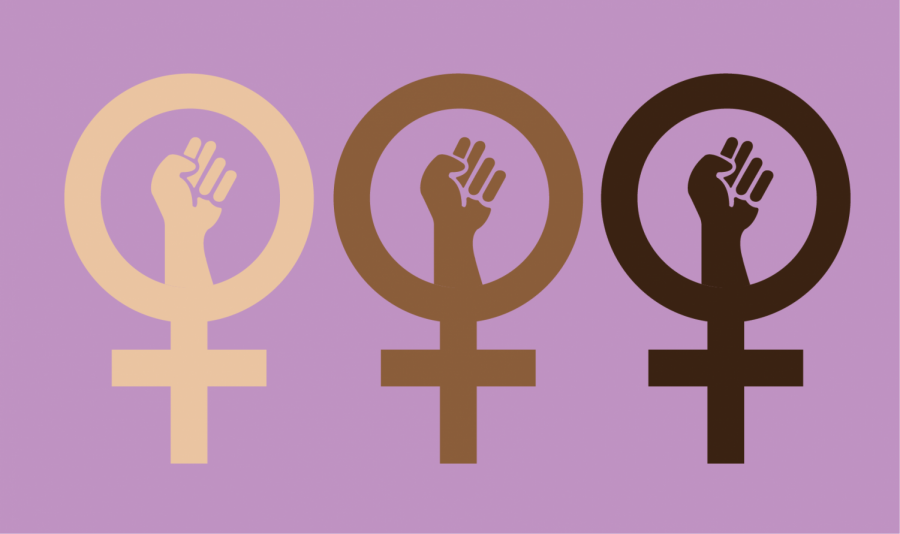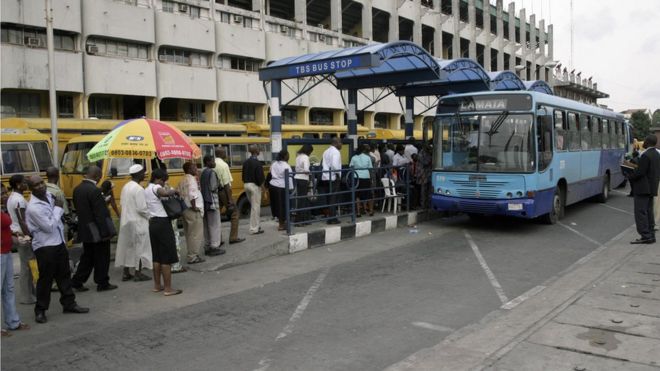
Nigeria’s President Muhammadu Buhari famously ordered people to form neat queues as part of his 1980s “War Against Indiscipline”. Can he make Nigerians queue again?
During Nigeria’s 2015 presidential election campaign one of the tactics used by the former President Goodluck Jonathan’s campaign was to remind voters of life under President Buhari when he was a military leader in the 1980s.
Pictures of Nigerians in long queues at banks and bus stops and people being whipped by soldiers imposing Gen Buhari’s so-called War Against Indiscipline were distributed in an effort to make him unelectable.
However, the anti-Buhari campaign had the opposite effect. Many Nigerians voted for him because of what they saw as his tough stance.
Thirty years after that war on indiscipline, President Buhari has unveiled a new version, this time with a toned-down name: “Change begins with me”.
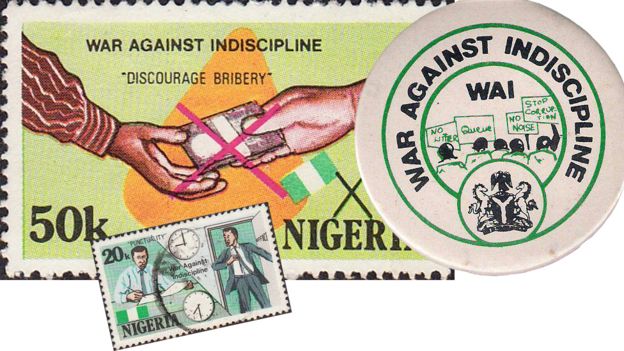
According to the government, the programme is aimed at fighting “dishonesty, indolence, unbridled corruption and widespread impunity” so that Nigerians can “embrace daily introspection over their ‘immoral’ conduct”.
During the launch of the campaign, President Buhari said: “Virtues like honesty, integrity, hard-work, punctuality, abhorrence of corruption and patriotism, had given way to dishonesty, indolence, unbridled corruption and widespread impunity”.
Many Nigerians will agree with the government that indiscipline is rife in everyday life.
At supermarkets, banks, hospitals and cinema ticket halls, people are expected to queue for their turn to be served.
But there are always those Nigerians that will jump the queue, and shout obscenities at anyone who challenged them.
Often there will be chaos in the queues and only those who can shout and fight get their way.
In hospitals, attendants often take bribes from those who wish to bypass queues and they serve those who are willing to pay.
It’s not only queues that illustrate indiscipline in everyday life. Lateness, bad driving and dumping rubbish are all normal.
Lateness, excused as “African time”, is endemic in Nigeria.
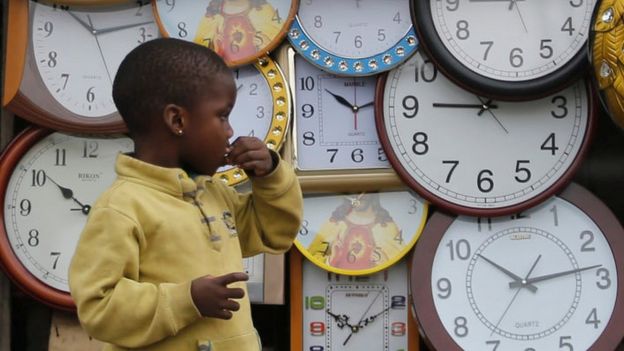 Image copyrightREUTERS
Image copyrightREUTERSIf you get an invitation to a public event and a top government official is expected to attend, it is not worth being there on time.
If an event is said to start at 13:00, the best time to be there is 15:00 or later.
The perennial lateness of domestic flights is legendary: the boarding time on your printed ticket is not taken seriously, and your flight often leaves more than three hours later.
Nigerians are used to it and are shocked when a flight actually takes off as scheduled.
Then there is rubbish.
In many places in Nigeria you might see dustbins perpetually empty. This is because people throw rubbish wherever they like.
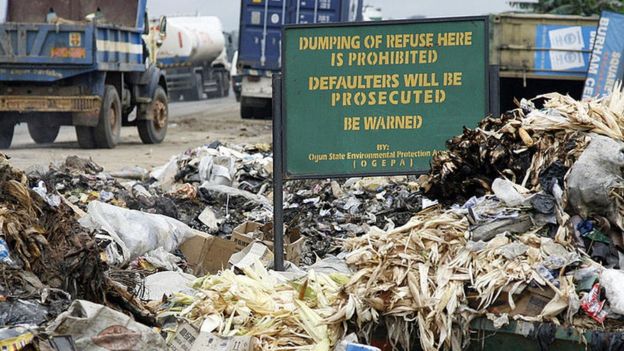 Image copyrightAFP
Image copyrightAFPOften, you will get strange looks if you ask for a rubbish bin to drop banana peel – from someone who thinks nothing of throwing the peel on the street.
Toilet manners aren’t much better.
Some Nigerians lack the self-respect to use the right facilities and use them correctly.
Recently, a picture was widely circulated online of a man urinating by the side of the road next to a bold police notice saying “Do Not Urinate Here”.
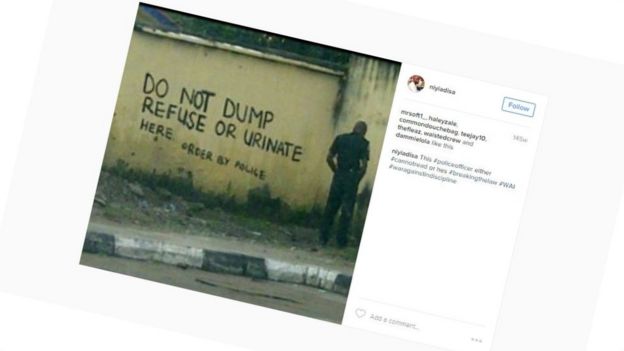
The situation is worse on the roads where people drive with impunity and ignore traffic signs.
In fact, people who observe the traffic rules put your life in danger.
Driving an expensive car is a licence to use your mobile phone while driving. The policeman is afraid of the big man.
If you survive a car crash in Nigeria, you should not celebrate too soon.
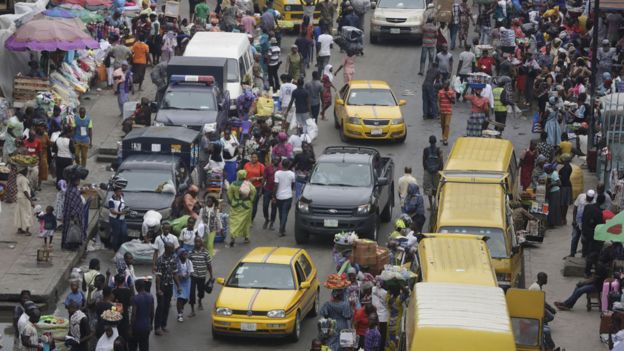
Here’s how it’s likely to play out: You will be writhing in pain from your injuries, the police will arrive at the scene and you might be asked to pay for petrol for the police car to take you to the nearest hospital.
A police station should be a place for the public to be reassured of government’s protection.
Instead they are dens of corruption.
If you want to report a crime, you had better have a paper and pen for the officers to fill in their forms. A bribe will also help make sure your case is investigated.
You will also need the money to buy your freedom from the police when they arrest you on trumped-up charges.
Corruption is a way of life. In many government offices you have to pay bribe to get things done, such as renewing identity documents like passports or driving licences.
The cycle of corruption is so familiar to Nigerians that when there’s a fire in a government office, people conclude that someone must have set the building on fire to eliminate the evidence of corruption.
I can’t list all the problems in Nigeria, and they are many, but Mr Buhari will need more than a slogan to begin to take them on.

Buhari’s wars against indiscipline in quotes
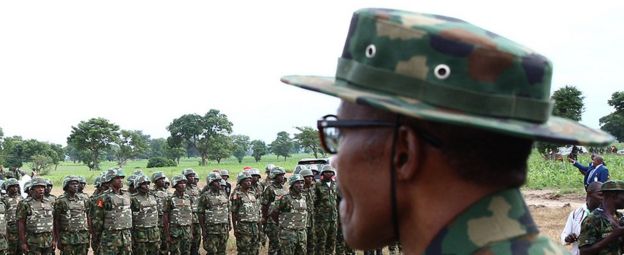
- 1983: “While corruption and indiscipline have been associated with our state of under-development, these two evils in our body politic have attained unprecedented height in the past few years.”
- 2016: “The long-cherished and time honoured, time-tested virtues of honesty, integrity, hard work, punctuality, good neighbourliness, abhorrence of corruption and patriotism, have given way in the main to dishonesty, indolence, unbridled corruption and widespread impunity.”

His challenge is that he’s trying to fight a system that has entrenched distrust between Nigerians and their leaders.
The public’s unenthusiastic reaction to President Buhari’s latest plan for making the country disciplined again shows what he’s up against.
While few Nigerians would deny that indiscipline is a big problem, many used social media to ridicule and criticise the plans.
Many think that he should start with his government in making the changes he wants to see in Nigerians. They say he should reduce waste of public resources.
They point to his 10 presidential planes, the unchecked spending by state governors and his inner circle who have been enriching themselves.
The discipline campaign might have worked in 1980s when Nigeria was still under military rule but it may be harder to discipline citizens under democratic rule.
This time, he cannot order soldiers to make civil servants who are late for work perform frog jumps in public.
Some believe the government should be talking about making food affordable, not forming a brigade to fight indiscipline.






